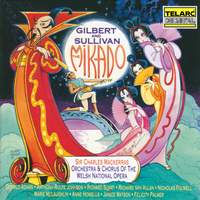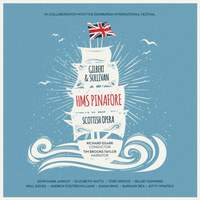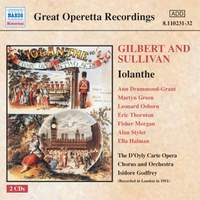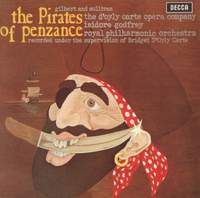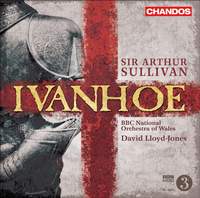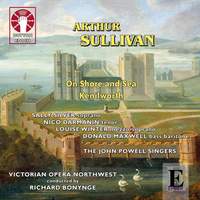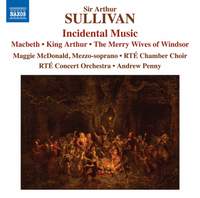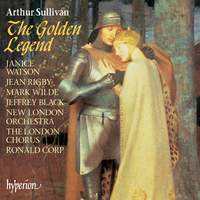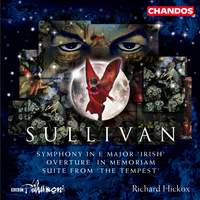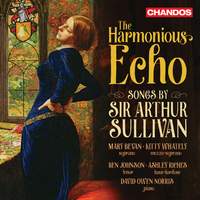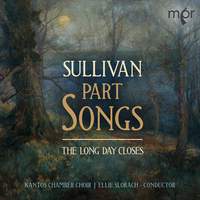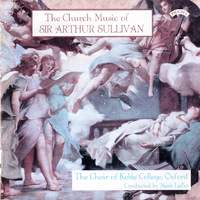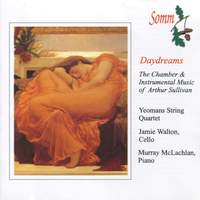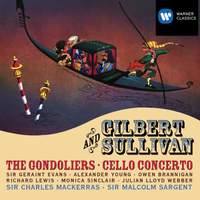Composer Guides,
Arthur Sullivan
Born in Lambeth into a musical family, Sullivan's initial exposure to musicmaking came via his father's post as a military bandmaster at the Royal Military College, Sandhurst. The young Sullivan showed talent as a wind player, but his father initially discouraged him from pursuing music as a career, knowing all too well how insecure it could be.
Still, his parents did not hold him back once it became clear that this was where his talents truly lay; choral singing at the Chapel Royal led directly to a scholarship to the Royal Academy of Music (aged only fourteen), studying both composition and piano. By this point Sullivan had already had several of his early compositions performed, and at least one was even published.
In London he studied with John Goss and William Sterndale Bennett; a trip to Leipzig added Carl Reinecke and Ignaz Moscheles to the list of influences on him. After graduation it rapidly became clear how right Sullivan's father had been to sound a note of caution; unable to support himself as a composer alone, he took on supplementary jobs as an organist, teacher and arranger.
It is from his early decades that his sole symphony and and concerto date, as does his first surviving opera, Cox and Box. This was the spark that ignited his success - enormously successful in its own right, it was also positively reviewed by one W. S. Gilbert.
It must be said that despite his undeniable success, Sullivan began to chafe against his identity as a writer of comic operas, feeling that his ambitions as a serious composer had been stifled. He began to disagree with Gilbert on plot elements that he felt were too whimsical or impractical, and in 1890 the partnership disintegrated entirely when Gilbert sued both Carte and Sullivan over what he saw as financial irregularities. Although the successful grand opera Ivanhoe dates from the following year, Sullivan's subsequent attempts to return to comic opera sans Gilbert were largely unsuccessful. Two reunions (for Utopia, Limited and The Grand Duke) fared a little better.

Sullivan had never been a particularly healthy man - even as a treble his stamina was limited, and from his thirties onward a kidney condition frequently forced him to conduct sitting down. His last published work was the posthumous Boer War Te Deum, written in anticipation of British victory in that conflict, which came in 1902. Sullivan, meanwhile, had died late in 1900 of heart failure; the final recognition of his talents (in addition to honoris causa doctorates from Oxford and Cambridge, titles conferred by the French and Turkish governments, and a knighthood) was his burial, by Queen Victoria's orders, in St Paul's Cathedral.
Immediately following his death, critical opinion rapidly began to turn against Sullivan - though a few, notably Edward Elgar, stoutly defended him, and Henry Wood kept the flame alive for his serious works. Still, it was not until the 1960s that levels of interest in, and respect for, Sullivan as a composer began to revive. The Savoy Operas, of course, are regularly performed around the English-speaking world by professional and amateur companies alike - but even these best-loved works remain surprisingly under-recorded, with venerable D'Oyly Carte Opera Company recordings from half a century ago continuing to hold the fort and seemingly little interest in recording new accounts. A 2016 recording of HMS Pinafore from Richard Egarr and Scottish Opera is a welcome exception to this - perhaps a straw in the wind and a sign of more to come?


Arthur Sullivan (1842-1900)
Curated by David Smith
A selection of some of the best recordings of music by the great Victorian composer - best known for his light operas written in collaboration with William Schwenck Gilbert and for his hymn-tunes. 1 hour 56 minutes
Donald Adams (The Mikado), Anthony Rolfe Johnson (Nanki-Poo), Richard Suart (Ko-Ko), Felicity Palmer (Katisha), Marie McLaughlin (Yum-Yum), Richard Van Allan (Pooh-Bah), Nicholas Folwell (Pish-Tush), Welsh National Opera, Sir Charles Mackerras
Available Formats: CD, MP3, FLAC
Elizabeth Watts (Josephine), Toby Spence (Ralph Rackstraw), John Mark Ainsley (Sir Joseph Porter KCB), Andrew Foster-Williams (Captain Corcoran), Hilary Summers (Buttercup), Neal Davies (Dick Deadeye), Gavan Ring (Bill Bobstay), Barnaby Rea (Bob Becket), Kitty Whately (Hebe), Tim Brooke-Taylor (narrator), Scottish Opera, Richard Egarr
Available Formats: MP3, FLAC, Hi-Res FLAC
Yvonne Dean, Ann Drummond-Grant, Martyn Green, Ella Halman, Joyce Hill, Margaret Mitchell, Fisher Morgan, Leonard Osborn, Alan Styler, Eric Thornton, D'Oyly Carte Opera Orchestra and Chorus, Isidore Godfrey
Available Formats: 2 CDs, MP3, FLAC
D'Oyly Carte Opera Company, Royal Philharmonic Orchestra, Isidore Godfrey
Available Formats: MP3, FLAC
Janice Watson (Lady Rowena), Geraldine McGreevy (Rebecca), Catherine Wyn-Rogers (Ulrica), Toby Spence (Wilfred, Knight of Ivanhoe), Peter Wedd (Maurice de Bracy), Andrew Staples (Locksley/The Squire); Adrian Partington Singers & BBC National Orchestra of Wales, David Lloyd-Jones
Available Formats: 3 CDs, MP3, FLAC
Sally Silver (soprano), Nico Darmanin (tenor), Louise Winter (mezzo), Donald Maxwell (bass-baritone), Victorian Opera Northwest, Richard Bonynge
Available Formats: CD, MP3, FLAC, Hi-Res FLAC
RTÉ Chamber Choir, RTÉ Concert Orchestra, Andrew Penny
Available Formats: CD, MP3, FLAC
Janice Watson (soprano), Jean Rigby (mezzo soprano), Mark Wilde (tenor), Jeffrey Black (baritone), Jonathan Brown (tenor), The New London Orchestra, The London Chorus, Ronald Corp
Available Formats: MP3, FLAC
BBC Philharmonic, Richard Hickox
Available Formats: CD, MP3, FLAC
Mary Bevan (soprano), Kitty Whately (mezzo), Ben Johnson (tenor), Ashley Riches (bass-baritone), David Owen-Norris (piano)
Available Formats: 2 CDs, MP3, FLAC, Hi-Res FLAC
Kantos Chamber Choir, Ellie Slorach
Available Formats: CD, MP3, FLAC, Hi-Res FLAC
The Choir of Keble College, Oxford, Gavin Plumley (organ), Mark Laflin
Available Formats: CD, MP3, FLAC
Jamie Walton (cello), Murray McLachlan (piano), Yeomans String Quartet
Available Formats: CD, MP3, FLAC
Glyndebourne Festival Chorus, Glyndebourne Chorus, Pro Arte Orchestra, Sir Malcolm Sargent, Julian Lloyd Webber (cello), London Symphony Orchestra, Sir Charles Mackerras
Available Formats: MP3, FLAC




